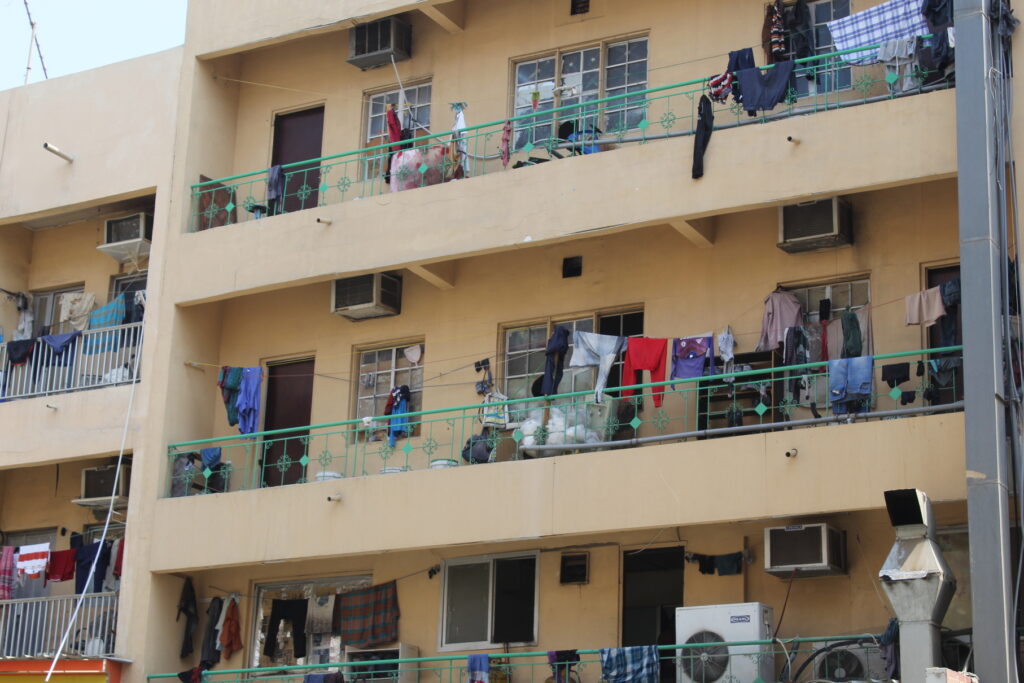As the pandemic further worsens Bahrain’s already struggling economy, many migrants are falling behind on rent payments due to layoffs, reduced income or unemployment.
Article 43 of Bahrain’s Labour Law allows employers to reduce wages by 50% in cases of force majeure.
“…if an employee reports to work but is unable to perform his/her job due to force majeure reasons beyond the employer’s control, the employee is entitled to receive half his/her wages.”
According to Bahrain’s labour law, employers are not obliged to provide accommodation to migrant workers (except for workers working and living in “rural” areas). Employers are only obliged to provide housing, either in the form of allowances or accommodation, if this is stipulated in the employment contract.
While most businesses in Bahrain are gradually reopening, the future remains bleak for many workers. For some migrants, particularly in the service sector, what was once a monthly salary is now paid on commission based on sales or services provided.
Erlinda, a salon employee from the Philippines, told Migrant-rights.org: “Since COVID-19, we’ve only been on-call. We come to work if there’s an appointment, but our pay is based on the services we provide, not a base salary.”
“Right now I don’t have enough customers and I can’t afford the rent. I don’t know where I’m going to get the money to pay the rent and my landlord is always pressuring me about the rent.”
According to survivors and social workers MR spoke to, landlords were generally tolerant of unpaid rent at the beginning of the pandemic, in part because the government had waived electricity and water bills for three months.
The exemption was later extended for three months, but only for Bahraini nationals. In an open letter to the Gulf Daily News, one migrant worker said foreigners were being unfairly excluded from these protections.
“In light of the ongoing fight against the effects of the coronavirus pandemic, we hope that the Bahraini government will also extend support to expats in terms of waiving electricity and water bills for the next three months. Unlike Bahraini nationals, expats have no government support to ensure their salaries are secured and paid on time, they have no bank loan payment extensions, housing privileges, medical assistance or allowances from the government.”
High electricity and water bills put migrants in dire straits in Bahrain
Between 2016 and 2019, Bahrain has been phasing out electricity and water subsidies for foreigners, whose annual fees are about nine times higher than Bahrainis. Many complain that electricity and water bills take a big chunk out of their already low wages, given that private sector workers have no minimum wage and labor laws do not require employers to provide housing.
Social workers said that during the crisis, government authorities had been reluctant to accept complaints from landlords about unpaid rent, generally advising them to be patient.
But six months into the crisis, landlords who depend on rental income have begun taking legal action to evict tenants where leases exist, and have resorted to threatening tenants and cutting off electricity to those who rent out rooms irregularly.
Kevin, who used to work in a hotel, has been on unpaid leave since the crisis began. He couldn’t pay his rent for five months. His landlord waived the rent but asked him to pay the electricity and water bills. But without an income, he couldn’t even pay those. He and his wife were forced to move out and rent another room with the help of a community group.
Their landlords have decided not to take legal action against them for unpaid rent. But social workers in Bahrain say others have not been so lucky: Courts are increasingly ruling in favor of landlords, leaving those evicted in limbo, unable to pay fines or challenge travel bans imposed because of the overdue payments.
Foreigners from all economic classes are affected, with even middle-income workers and those with families at risk of homelessness.
A social worker from the Indian Community Relief Fund told MR: “Low-income workers can rent out rooms in BD20 and live in crowded accommodation to save on costs, but those with families have higher rents, higher expenses and with the pandemic they are struggling now… We are getting more calls from them seeking help.”
It’s not just private property owners who are evicting tenants.
Bahraini authorities cut off electricity and water to hundreds of worker accommodation buildings in mid-summer (when temperatures reach 45°C) as part of a ruthless campaign to decongest overcrowded worker accommodation and evict workers. 61 days into the campaign, the government cut off electricity to 532 buildings. No alternative housing has been provided to these workers.
In April, the government announced it had begun relocating residents from overcrowded housing to schools and other public facilities, but these efforts have been limited, with only about 9,000 of the tens of thousands of workers who continue to live in overcrowded, dilapidated housing being relocated.
In JuneMuharraq city council also passed a proposal to cut off electricity and water to crowded worker housing in the city. A Bangladeshi worker told MR that government authorities had cut off the electricity to his apartment complex, forcing him to temporarily move with his friends to another, more crowded apartment.
It is crucial to guarantee everyone’s right to remain in their homes or to have access to uncrowded, adequate housing and affordable utilities, especially during a global pandemic. The Bahraini government must suspend all evictions, lift travel bans for those with court sentences, and provide rent relief to workers who have lost their income due to the COVID-19 pandemic.
Laws must also be enacted to hold employers responsible for providing adequate housing for migrant workers. If a state decides to delegate migration responsibility to private employers (as is the case with kafala laws), employers must at the very least be responsible for providing adequate housing for workers.

